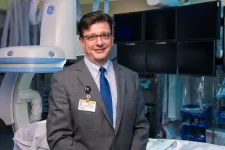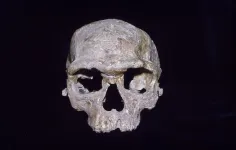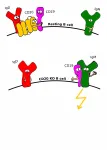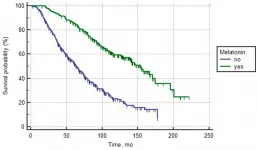RUDN University veterinarians tested a new drug against pneumonia in calves
2021-02-10
(Press-News.org) Respiratory tract diseases in young animals of the cattle are a big issue for world agriculture and food safety because a bacterium that causes them is resistant to most antibiotics. A team of veterinarians from RUDN University developed and tested a complex preparation called gentaminoseleferon that could help treat respiratory infection in calves. The results of the study were published in the Veterinary World journal.
Bacteria of the genus Mycoplasma cause many infectious diseases in animals, including atypical pneumonia, other respiratory tract conditions, reproductive pathologies, arthritis, keratoconjunctivitis, mastitis, and so on. The genus includes about 200 species of bacteria, and all of them are dangerous for animals. While the action of many antibiotics is focused on the destruction of bacterial cell walls, Mycoplasma cells don't have it which makes Mycoplasma diseases difficult to treat. A team of veterinarians from RUDN University tested a new drug against Mycoplasma dispar that often causes pneumonia in calves.
"Respiratory diseases of young cattle cause economic damage on a global scale. They are treated with complex preparations that support natural body resistance, normalize metabolism, and have an anti-inflammatory effect. Our goal was to study the therapeutic efficiency of gentaminoseleferon against respiratory tract diseases in calves, in particular the Mycoplasma dispar infection," said Mohammad Abed Alhussen and Hamdan Naef, postgraduate students at the Center for Innovative Veterinary Medicine, RUDN University.
The team conducted a pilot study of the drug on 15 calves that were divided into three groups: the first one was a control group with healthy animals and the second and the third contained calves with early clinical signs of the respiratory infection. Each calf from the second group was intramuscularly injected with 5 to 10 ml sulfetrisan (a drug based on the antibiotics sulfadimethoxine, erythromycin, and trimethoprim that is traditionally used to treat this disease) for seven days. The third group received gentaminoseleferon injections in the dose of 1 ml per 10 kg of mass for the same time. The healthy calves from group one did not receive any treatment. The team took blood samples from all animals 10 days before and after the treatment.
As a result of treatment, the biochemical properties and plasma parameters of the blood of infected calves returned to normal. Moreover, the third group experienced an additional positive effect: the protein content in their blood plasma increased by 2.2% compared to the second group, the level of vitamin A grew by 13.5%, E by 11.9%, C by 15.1%, iron by 9.3%, and zink by 4.1%. While in the course of the illness the bodies of the calves lacked these vitamins and microelements, after the treatment they returned to normal levels.
"These results indicate a prominent decrease of inflammatory processes in the respiratory tract along with active recovery of metabolism, thus confirming the therapeutic efficiency of gentaminoseleferon," added Mohammad Abed Alhussen and Hamdan Naef from RUDN University.
INFORMATION:
[Attachments] See images for this press release:
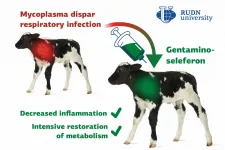
ELSE PRESS RELEASES FROM THIS DATE:
2021-02-10
Every day, people die from simple infections even though they have been treated with antibiotics. This is because more and more bacteria have become resistant to the types of antibiotics that doctors can prescribe.
- It's a huge societal problem and a crisis that we must solve. For example, by developing new antibiotics that can defeat the resistant bacteria, says professor of chemistry at the Department of Physics, Chemistry and Pharmacy, University of Southern Denmark, Poul Nielsen.
Resistant bacteria are not only known from pig farms, where it is becoming increasingly difficult to keep the pigsties disease-free. Hospitals are also experiencing with increasing regularity that, for example, infectious diseases cannot be controlled in patients. Thus, ...
2021-02-10
Can long-term stress lead to heart attacks? Most people would probably answer in the affirmative, but the scientific evidence of this is scarce. A new study by researchers from Linköping University in Sweden reveals that the levels of the stress hormone cortisol were increased in the months preceding a heart attack. The results, published in Scientific Reports, suggest that long-term stress is a risk factor for heart attacks.
"The levels of the stress hormone cortisol differed between people who have had a heart attack and those not affected. This suggests that cortisol in hair may be a new risk marker for heart attacks. We must take stress seriously", says Professor Tomas Faresjö from the Department of Health, ...
2021-02-10
Ruptured abdominal aortic aneurysms (rAAA) are responsible for nearly 2% of all deaths in U.S. men over the age of 65. Endovascular aneurysm repair (EVAR) has emerged as a newer and less invasive alternative to open repair for rAAA, and current guidelines recommend EVAR as a first-line option for treatment of rAAA when certain criteria are met. But researchers from the University of Missouri School of Medicine have discovered that while EVAR is more commonly utilized for rAA, shortens hospital stay and has a lower initial mortality rate, the odds of ...
2021-02-10
Researchers at the RIKEN Center for Biosystems Dynamics Research in Japan have discovered a recipe for continuous cyclical regeneration of cultured hair follicles from hair follicle stem cells.
Scientists have been making waves in recent years by developing ways to grow a variety of useful items in laboratories, from meat and diamonds to retinas and other organoids. At the RIKEN Center for Biosystems Dynamics Research in Japan, a team led by Takashi Tsuji has been working on ways to regenerate lost hair from stem cells. In an important step, a new study identifies a population of hair follicle stem cells in the skin and a recipe for normal cyclical regeneration in the lab.
The researchers took fur and whisker cells ...
2021-02-10
Experts from the Natural History Museum, The Francis Crick Institute and the Max Planck Institute for the Science of Human History Jena have joined together to untangle the different meanings of ancestry in the evolution of our species Homo sapiens.
Most of us are fascinated by our ancestry, and by extension the ancestry of the human species. We regularly see headlines like 'New human ancestor discovered' or 'New fossil changes everything we thought about our ancestry', and yet the meanings of words like ancestor and ancestry are rarely discussed in detail. In the new paper, published in Nature, experts review our current understanding of how modern human ancestry around the globe can be traced into the distant ...
2021-02-10
MINNEAPOLIS/ST.PAUL (02/10/2021) -- University of Minnesota Medical School researchers studied SARS-CoV-2 infections at individual cellular levels and made four major discoveries about the virus, including one that validates the effectiveness of remdesivir - an FDA-approved antiviral drug - as a form of treatment for severe COVID-19 disease.
"Since the start of the COVID-19 pandemic, the way that each individual responds differently to the infection has been closely studied. In our new study, we examined variations in the way individual cells reacted differently to the coronavirus and responded to antiviral treatment," said Ryan Langlois, PhD, senior author of the study, associate professor in the Department ...
2021-02-10
PHILADELPHIA -- Past exposure to seasonal coronaviruses (CoVs), which cause the common cold, does not result in the production of antibodies that protect against the novel coronavirus SARS-CoV-2, according to a study led by Scott Hensley, PhD, an associate professor of Microbiology at the Perelman School of Medicine at the University of Pennsylvania.
Prior studies have suggested that recent exposure to seasonal CoVs protects against SARS-CoV-2, the virus that causes COVID-19. However, research from Hensley's team, published in Cell, suggests that if there is such protection, it does not come from antibodies.
"We found that many people possessed antibodies that could bind to SARS-CoV-2 before the pandemic, but these antibodies could not prevent infections," Hensley said. ...
2021-02-10
Researchers from the University of Basel have developed a virtual reality app for smartphones to reduce fear of heights. Now, they have conducted a clinical trial to study its efficacy. Trial participants who spent a total of four hours training with the app at home showed an improvement in their ability to handle real height situations.
Fear of heights is a widespread phenomenon. Approximately 5% of the general population experiences a debilitating level of discomfort in height situations. However, the people affected rarely take advantage of the available treatment options, such as exposure therapy, which involves putting the person in the anxiety-causing situation under the guidance of a professional. On the one hand, people ...
2021-02-10
Rituximab, an anti-cancer drug targeting the membrane protein CD20, was the first approved therapeutic antibody against B tumor cells. Immunologists at the University of Freiburg have now solved a mystery about how it works. A team headed by Professor Dr. Michael Reth used cell cultures, healthy cells, and cells from cancer patients to investigate how CD20 organizes the nanostructures on the B cell membrane. If the protein is missing or Rituximab binds to it, the organization of the B cell surface changes. The resting B cell is activated in the process. The team has published the research in the journal PNAS as part of contributions by new members of the National Academy of Science.
B cells are white blood cells and part of the immune system. When they recognize ...
2021-02-10
Oncotarget recently published "Melatonin increases overall survival of prostate cancer patients with poor prognosis after combined hormone radiation treatment" which reported that a retrospective study included 955 patients of various stages of prostate cancer who received combined hormone radiation treatment from 2000 to 2019. Comprehensive statistical methods were used to analyze the overall survival rate of PCa patients treated with melatonin in various prognosis groups.
The overall survival rate of PCa patients with favorable and intermediate prognoses treated or not treated ...
LAST 30 PRESS RELEASES:
[Press-News.org] RUDN University veterinarians tested a new drug against pneumonia in calves


